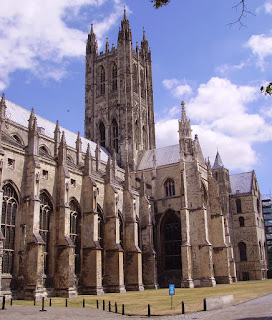 In five days, I hope to be standing in a spot I have thought about for 40 plus years. We are visiting England soon, and among other places we will visit is Canterbury.
In five days, I hope to be standing in a spot I have thought about for 40 plus years. We are visiting England soon, and among other places we will visit is Canterbury.Pilgrims all! We will make a day trip to this site that was once one of the most visited places in all Christendom. (Remember Chaucer's Canterbury Tales? Yup, about pilgrims visiting that famous site.)
When I was a young master's student, I selected as my thesis topic the contrast between the historical Thomas Becket and the dramatic presentation of him in two plays: Jean Anouilh's play Becket and T.S. Eliot's play Murder in the Cathedral. In an absolute gift for research, I had a newly published biography of Becket which helped me to sort out man from myth.
Becket was a larger than life character. Educated as a priest, one of the few options available for advancement for a young man without means, he and Henry II, king of England, were grand friends, bar-hopping and whoring together. Then, Becket was named Archbishop of Canterbury, found God, and turned on his friend, the king. In a radical turnabout, he began to block Henry's wishes at every opportunity. Henry was one of those fantastic monarchs who coalesced the power of the monarchy, at that time. But Becket stood in his way, insisting on the ancient powers of sanctuary and the ecclesiastical law.

In a fit of rage, Henry is reputed to have screamed "Will no one rid me of this priest" which four of his nobleman in Normandy (where the English kings resided) overheard. They promptly crossed the English Channel, stormed into Canterbury Cathedral, where they encountered Becket, who had sought sanctuary at the high altar. Perhaps taking their clue from their king, the knights ignored the high holy altar, and with swords raised, hacked Becket to pieces, scattering his brains on the stones. Faithful servants finding the devastated remains of their beloved archbishop gathered up the remnants of his body.
Becket was fast-tracked for sainthood. He was martyred in 1170 and was named a saint in 1173--almost unheard of (then). It was his elevation to sainthood that got all those pilgrims tromping off to Canterbury in the first place.
I too shall soon be standing there, contemplating Thomas the man and the myth. I do not know what I will feel when I stand there, but perhaps in a week or so, I shall be able to give a report.
---------------
Image of Canterbury Cathedral from Wikipedia Commons
Image of Becket at the altar from http://www.nndb.com/people/838/000086580/



















